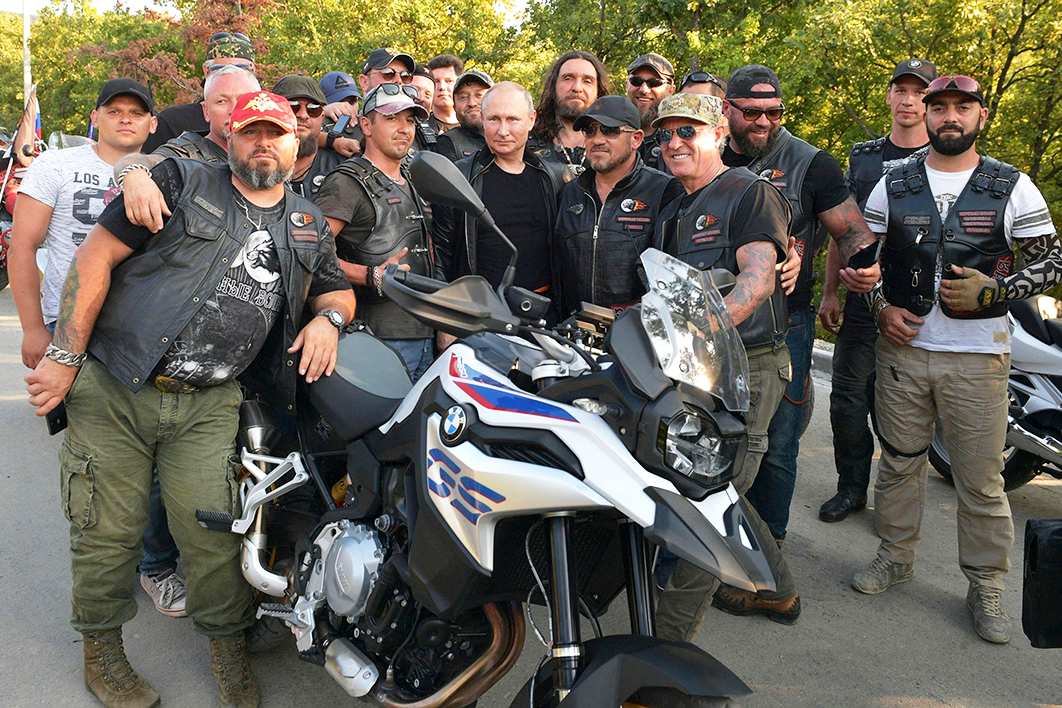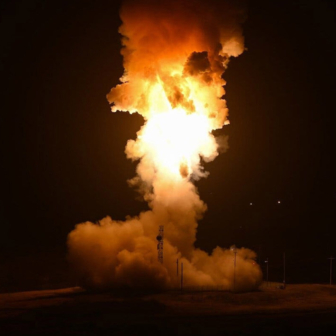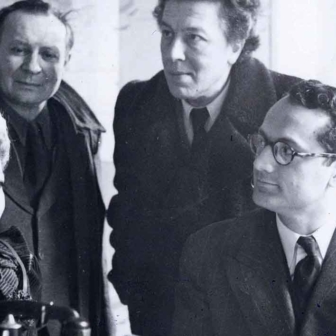When the Australian Open was briefly overshadowed by a pro-Kremlin propaganda spectacle late last month, the appearance of Novak Djokovic’s father, Srdjan, alongside the apparent ringleader turned a relatively small demonstration into international news.
What attracted less attention was the fact that many of the flag-wavers were members of the Australian chapter of the Night Wolves, a Russian biker gang that combines radical nationalism with paramilitary activities.
In a video of the incident posted by a pro-Putin activist, a prominent member of the Australian Night Wolves wears the gang’s t-shirt emblazoned with a flaming red wolf, a large white “Z” and its motto, “Where We Are, There Is Russia.” He addresses the gang’s leadership in Moscow, shouting “Brother Aleksandr Zaldostanov — greetings from Melbourne!” in Serbian. His next, muffled words, echoed by Srdjan Djokovic, have variously been interpreted as “Long live Russia!” or “Cheers, people!”
It was another small win for the Kremlin’s information warriors. Within a week, the video of this strange performance had notched up 187,000 views on the YouTube channel of the pro-Putin activist, “Aussie Cossack” Simeon Boikov. The content has been widely circulated on the Putin regime’s propaganda platforms, which hailed Srdjan Djokovic as a hero and denounced the Western media for persecuting him for his pro-Russian sympathies.
I have followed the enablers of this incident, the Night Wolves, for many years. My interest was sharpened by my research for a book about the place of a Russian neo-Nazi movement, Russkii Obraz, in the Kremlin’s manipulation of Russian nationalism. For the leader of Russkii Obraz, the Night Wolves were an object lesson in how an extremist movement could win the approval of the regime and carve out a niche in public life.
The Night Wolves represent a minuscule fringe of Australia’s Russian and Serbian communities. But there are sound reasons to be concerned about their activities.
The most obvious is their connection to the Russian state. From their first demonstration alongside neo-Nazi groups outside Sydney’s Russian consulate in 2016, Australia’s Night Wolves have acted as conduits of influence for the Putin regime. They joined Kremlin propagandists in a social media campaign against Aleksei Navalny. They organised screenings of Russian nationalist propaganda at cinemas around the country. And they tried to intimidate an anti-Putin protester outside a Russian consulate.
No less disturbing is the gang’s relationship to their Russian mother organisation, which is connected to the Putin regime on multiple levels. As well as their close links to the security apparatus, the Russian Night Wolves are beneficiaries of extensive state support, ranging from presidential grants to real estate and free advertising. In return for this largesse, they play a major role in the ecosystem of radical nationalist groups that sustains Putin’s regime and its war against Ukraine.
Uniquely among pro-Kremlin nationalists, the Night Wolves have a mass appeal. Their motorbike shows attract large crowds and television audiences with expensively choreographed spectacles combining fireworks, motorcycle stunts and patriotic rock bands. Behind the theatrics, each show presents a narrative about the eternal struggle between Russia’s pure traditions and a demonic monster representing the West.
These warped morality tales reflect the political vision of the gang’s leader, Aleksandr Zaldostanov (“Surgeon”), who makes no secret of his imperialist convictions. He is obsessed with the idea of a “Fifth Empire,” the blueprint for a new totalitarianism proposed by the novelist and neo-Stalinist ideologue Aleksandr Prokhanov. According to Zaldostanov, the Fifth Empire will unite the legacies of four historical Russian empires — from Kievan Rus to Stalin’s USSR — into a new global power under Vladimir Putin.
Underlying this project is the classic fascist dream of a violent, regenerative nationalist revolution. The aim is to save humanity from the moral decadence brought by Western democracy, which Zaldostanov defines as “global Satanism.”
What magnifies the danger of this ideology is the paramilitary force at Zaldostanov’s disposal. The Night Wolves’ business interests include a network of private security companies that employ ex-military and security personnel. The most important is Wolf Holdings of Security Structures, which was sanctioned by the US government in June 2017 for its involvement in the Ukrainian conflict.
These veterans played a conspicuous role in Russia’s invasion of Crimea in 2014, when they operated roadblocks, kidnapped a Ukrainian general, and stormed a naval headquarters.
Later they participated in Putin’s onslaught on southeast Ukraine. They are particularly close to the leadership of the Russian puppet state in Lugansk. A monument to Zaldostanov’s Fifth Empire, titled “A Symbol of the New Russia in the Eyes of the Night Wolves,” stands in front of the Lugansk government headquarters.
The Night Wolves have also helped to project Russian power in Europe and the Balkans. They stage regular “club runs,” long-distance motorcycle rides that serve as rallying points for local nationalists and fuel for Russian propaganda. Their security structures are the backbone of a network of “Volk Systema” martial arts clubs that claim to provide training in special forces combat techniques to police and the armed forces. Investigative reporting in Hungary, a NATO member state, suggested that this poses a real security risk.
One of the Night Wolves’ most audacious interventions was the failed coup in Montenegro on the eve of elections in 2016. A co-founder of the Serbian chapter of the gang testified that Russian intelligence agents arranged for him to visit Moscow, where he was given encrypted telephones and more than US$200,000 for weapons and recruitment.
Today the Night Wolves are deeply implicated in Putin’s war against Ukraine. In April last year, Zaldostanov hailed the invasion as yet another “battle against Satan.” The combatants include the Night Wolves’ own paramilitary unit, Night Wolves Pyatnashka. “These lads came to the Donbass with a clear motivation and an understanding of what is happening here,” writes pro-Kremlin military journalist Pavel Kukushkin. “They didn’t come to take pictures. The boys are fighting like everyone else.”
The Night Wolves’ complicity in Putin’s aggression has not gone unnoticed in the West. As early as December 2014, the US government sanctioned the gang for actions that “threaten the peace, security, stability, sovereignty, or territorial integrity of Ukraine.” Canada blacklisted Zaldostanov a few months later. An EU-wide ban was imposed in July last year. It may be time for Australia to open its eyes to the Putinists in our midst. •




